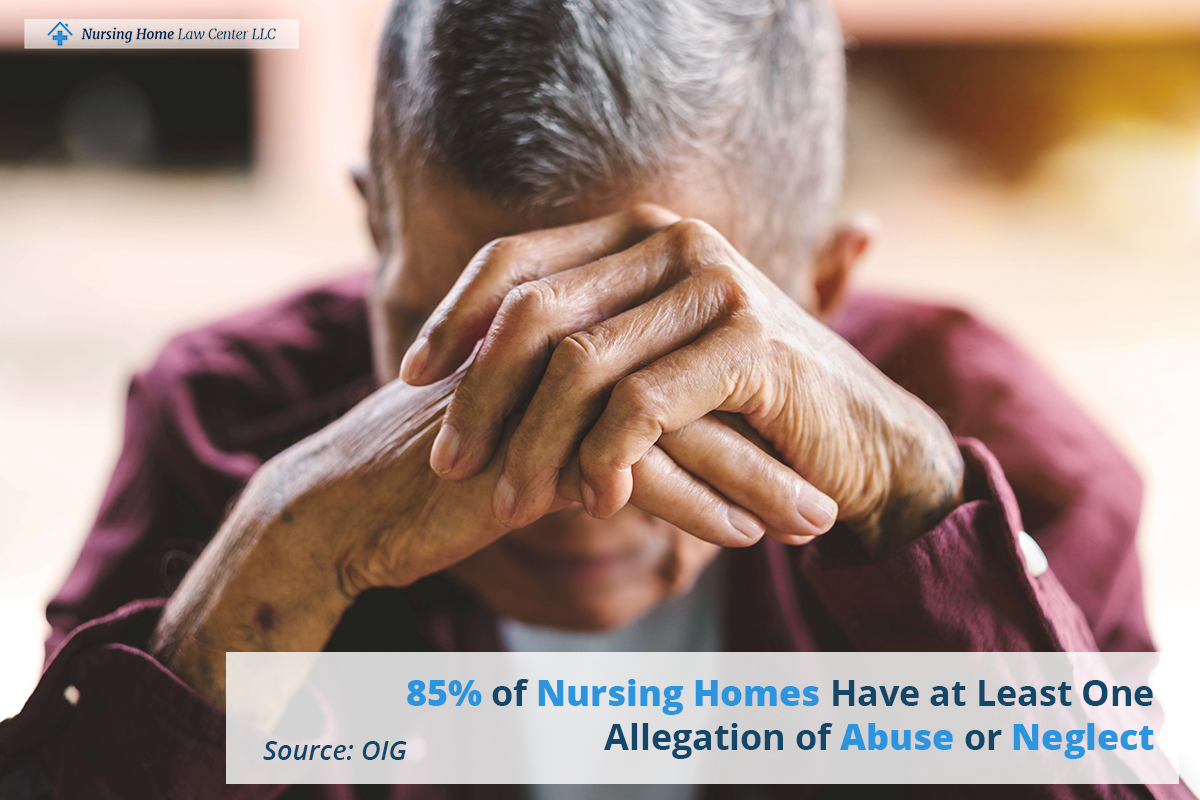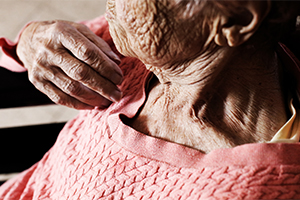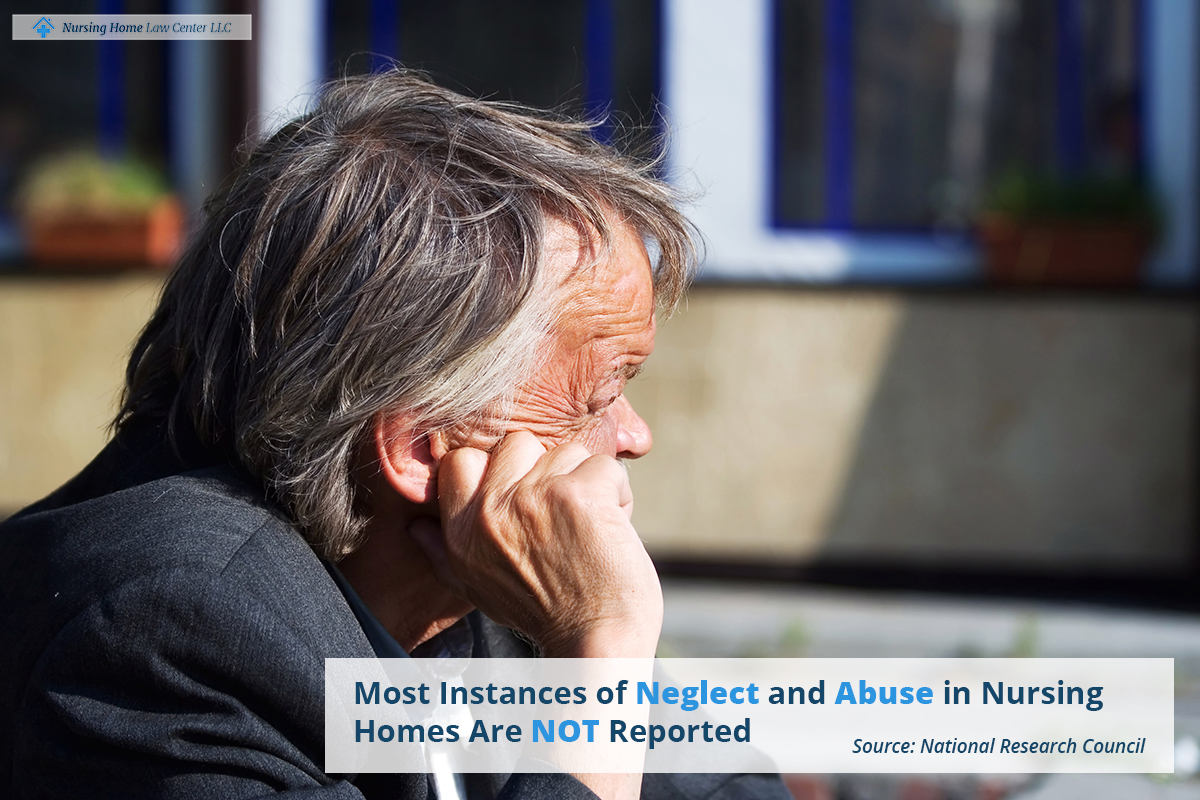legal resources necessary to hold negligent facilities accountable.
Nursing Home Abuse Lawyer
Is your elderly loved one the victim of nursing home neglect or abuse caused by the negligent actions of caregivers, visitors, family members, friends, or other patients?
Our personal injury lawyers at Nursing Home Law Center, LLC, work as legal advocates for senior citizens, the disabled, and those living in nursing centers, group homes, and assisted-living facilities.
Call our nursing home abuse lawyers at (800) 926-7565 (toll-free phone number) or use the contact form today to schedule a free consultation.
All confidential or sensitive information you share about the nursing home abuse case remains private through an attorney-client relationship.

Statistics reveal that more than 60% of nursing home residents have suffered from abuse at the hands of other residents. In addition, studies have shown that almost 15% of patients have been victims of neglect by their caregivers.
Additionally, according to the World Health Organization, 2 in 3 staff members admitted to committing abuse in the last year.
Elderly patients often face a higher risk for nursing home neglect as they're seen as defenseless and unable to speak out about what's happening around them. Unfortunately, it makes it all too easy for nursing home employees to mistreat patients with impunity.
Nursing home negligence can take a terrible toll on those it harms.
It's even known to cause wrongful death in some nursing home abuse cases. Because victims fall into depression or lose the will to live, they struggle to cope with the daily torment of negligent staff members and other nursing home residents.

The elderly population is often the victim of nursing home abuse. If an abusive caregiver has injured you or a loved one in your nursing home, contact an experienced nursing home abuse lawyer at Nursing Home Law Center, LLC, to discuss your legal options.
Our nursing home lawyers have helped hundreds of victims who have suffered negligence and were exposed to health and safety hazards to get the compensation they deserve for their injuries.
Our legal team is committed to holding negligent long-term care facilities, including assisted living facilities, accountable for poor care resulting in a resident's injury or death, with all the applicable nursing home laws.
A nursing home abuse lawyer from our offices can file a nursing home negligence case to recover compensation for your family members' pain, physical health problems, and medical bills.
Call a nursing home abuse attorney at (800) 926-7565 (toll-free phone call) or use the contact form today to schedule a free consultation to commence the nursing home litigation process.

Elder abuse is a crime that often goes unnoticed. It can be hard to spot the common signs of nursing home abuse cases, but it can happen in all relationships between older and younger people.
If you know an elderly individual experiencing elder neglect and abuse in a skilled nursing facility, get them to a safe place and contact a nursing home attorney from our offices.
Physical AbuseWhen you see signs of abuse in an elderly individual, it could involve hitting, kicking, biting, scratching, burning, or causing injury by using other objects, such as a cane or wheelchair.
Signs of mental abuse often accompany physical mistreatment. In addition, neglect can include withholding food and water, denying medical treatment, or ignoring basic hygiene needs.
Sexual AbuseUnfortunately, older people are often at a loss to defend themselves against sexual assault.
Sexual abuse often occurs with abuse, neglect, and other senior abuse. Unfortunately, identifying the sexual assault predator could be difficult because it usually involves a nursing home employee, caregiver, or close friend.
Call a nursing home abuse lawyer if you suspect a loved one has been abused!

Some signs that elderly individuals in nursing homes are being abused include fearfulness or anxiety, poor hygiene and nutrition, withdrawal from activities they usually enjoy, and signs of depression or other mental health problems.
In addition to these warning signs, you might notice a lack of concern for the victim's well-being from those who interact with them regularly.
Sometimes it can be hard to know the actual situation. That's why paying attention to warning signs and seeking help from protective services and an elder abuse attorney is essential if you believe an older person is in danger.
Remember that it is not your responsibility to figure it out independently, but rather a job for those with more training and expertise than you have.
How to Advocate for a Nursing Home ResidentLiving alone in a nursing home facility in an abusive environment can be a frightening and degrading experience for any elderly patient. But unfortunately, there are often very few people around to advocate to make life better.
If you have a friend or family member living in a nursing home facility, you can take specific steps to help protect them from abuse and neglect. Protect your loved one from abuse and neglect by following these simple steps:
- When the nursing home staff members least expect you to be there, show up to visit at odd hours. Arriving unannounced will allow you to locate any evidence of suspicious activity.
- Ask your loved one if any staff member seems unkind or abusive. If their answers match other residents' complaints, report this information to the facility administrator and your nursing home neglect attorneys.
You may also want to contact the police department and report any abuse or neglect you've witnessed. If your loved one is physically assaulted, taken advantage of, or disrespected in any way by staff members, they're not safe where they are.
Families affected should keep detailed records of all their conversations with nursing home staff or administrators, including the date and time they spoke. This information can help bolster their nursing home abuse claim if they need to pursue legal action.
Contacting an experienced nursing home negligence lawyer can help you source your options and determine the next steps.

Nursing home abuse lawyers can take immediate legal action to protect your loved one to ensure the abuse or neglect stops.
Next, the attorney will work to ensure that your loved one receives the full financial compensation they're entitled to for their injuries.
The attorney will report any abuse or neglect-related incidents to the proper authorities. Law enforcement, state and federal regulators and social workers will ensure the abuse doesn't continue.
But, if it does, your nursing home neglect attorney will fight to ensure that the negligent parties are removed from their positions at the nursing home and hold the abusers accountable.
A Place to Turn for HelpNursing home abuse victims often feel like there's no safe place to turn for help. After all, many nursing homes employ underpaid nursing staff with inadequate training to care for dozens or hundreds of patients daily.
This act can lead to a lack of care, which leads to victims being mistreated and abused by negligent nursing home staff.
Personal injury lawyers have experience handling complex nursing home neglect and abuse lawsuits. They know the ins and outs of federal and state laws regarding abuse in nursing homes nationwide.
Many nursing home lawsuits involve acute events or long-term neglect where the nursing home fails to provide essential care.
Paying for Fees on a Contingency Fee BasisNursing home lawyers work on a contingency fee basis, which means they only receive a payment if your loved one wins their nursing home abuse case. This rule means you don't pay anything out of pocket to hire them and can rest easy knowing there's no risk involved for your loved one.
Reputable nursing home abuse lawyers will offer a free case review and use this meeting to fully understand your loved one's case. In addition, this is an excellent opportunity for your family and friends to discuss their injuries, losses, and fears about returning to the facility with a qualified nursing home abuse attorney.
Do You Suspect Nursing Home Neglect? Get Legal Help Now!You should contact a personal injury lawyer when you suspect nursing home medical malpractice at someone else's hands. They will work closely with you and your loved one to review each detail of their case and build a strong foundation for their claim.
The sooner an attorney is contacted, the easier it will be to obtain critical evidence such as:
- Medical records that might show medical malpractice cases against the nursing home
- Documents related to the nursing home abuse incident
- Video from surveillance cameras that show what happened and who was involved
- Transcripts from investigative meetings with police and state regulators
- Emails and letters sent to your loved one by staff or others at the facility could provide critical information about nursing home abuse that proves that your loved one hasn't been exaggerating their injuries.
Your loved one's nursing abuse lawyers must build this case before it can be presented to a judge or jury.
Hiring a Nursing Home Law Center Lawyer: How They Can Help You Get the Compensation You DeserveIf you or a loved one has suffered nursing home abuse, you may be entitled to financial compensation for your injuries, medical bills, and other damages. A nursing home abuse lawyer can help you navigate the legal process and ensure that your rights are protected.
At Nursing Home Law Center, LLC, our experienced elder abuse attorneys have years of experience helping clients who have suffered serious injuries or wrongful death as a result of abuse or neglect.
We understand the emotional and physical toll that nursing home abuse can take, and we are committed to helping our clients get the compensation and justice they deserve.
Free Case EvaluationWhen you work with our legal team, we will start by conducting a free case review to determine whether you have a viable claim for nursing home abuse.
We will then work with you to gather all of the necessary medical records and other evidence to support your case, and we will handle all aspects of the legal process to make it as easy and stress-free as possible.
Whether pursuing a wrongful death lawsuit or negotiating a settlement with the nursing home, our legal team will be by your side every step of the way.
Our nursing home abuse law firms will fight to hold the facility accountable for their actions and help you get the financial compensation you need to move forward with your life.

Our nursing home abuse lawyers understand that many families have unanswered questions about negligence and abuse involving the elderly and how to take immediate action to stop the mistreatment. Our nursing home abuse lawyers have answered some of those questions below.
Call a nursing home lawyer at (800) 926-7565 (toll-free phone number) or use the contact form today for additional information. Whatever you discuss with our nursing home abuse attorneys remains private through an attorney-client relationship.
What Can I Do if I Suspect Nursing Home Abuse?If you have reason to believe that some elderly individuals are being abused in some nursing homes. You could:
- Learn about the warning signs of abuse against the elderly
- Find out who can help
- Speak up when something doesn't seem right, and don't wait for someone else to act
Here are some questions that may help determine whether abuse is occurring to nursing home residents:
- Does the nursing home resident have as much food as they used to? Is it of lower quality or spoiled?
- Is the nursing home patient not as clean and well-kept as they used to be?
- Is the older person not wearing as nice clothing as before?
If you find that the older person is being abused, it can be complicated to ask them about it. However, if you suspect abuse, seek help from a professional elder care attorney. These professionals understand how to approach the situation with your loved ones in a way that won't upset or cause further physical abuse.
What Can Happen If You Don't Report Nursing Home Abuse?The consequences of not reporting elder abuse include allowing an abuser to continue their pattern of mistreatment, which could lead to worse conditions for the victim or even wrongful death.
In addition, if you do not report nursing home abuse, there's a chance that you won't be able to recover the financial losses incurred as a result of neglect and exploitation. Moreover, you are putting other residents in nursing homes at risk for similar inferior care.
Why is Nursing Home Abuse So Prevalent?According to the National Center on Elder Abuse, one in three nursing home residents is mistreated while under the care of others. And for every case that gets reported, experts believe many nursing home abuse cases go unreported.
Sadly, anyone can become a victim of nursing home abuse. If you suspect your loved one is in danger at their facility, don't hesitate to get involved and protect them. Seek legal help on how to file nursing home abuse lawsuits.
Do I Have Grounds to File a Lawsuit Against a Nursing Home or Assisted Living Facility?When nursing homes fail to provide the required care to your loved one and serious injuries or medical malpractice occurs, you may have grounds to pursue a nursing home abuse lawsuit.
Our team of affiliated nursing home abuse lawyers has experience prosecuting injury and wrongful death lawsuits involving all types of long-term care facilities. Many of our cases involve: falls with fractures, pressure sores, sepsis infections, and medication errors.
Contact our elder abuse lawyers and let our legal teams begin evaluating your rights related to a nursing home abuse lawsuit.
What Are The Immediate and Long-Term Risks of Nursing Home Abuse?Although many older Americans plan to move into a nursing center one day, they often don't think through the consequences of that choice.
Still, they may not realize that entering one of these nursing homes means giving up much of their freedom in exchange for medical care and hygiene assistance.
One of the most significant risks of nursing facilities is the vulnerability to abuse. There can be many reasons for harm, including medical malpractice and exposure to other patients who can cause damage.

Once you contact our personal injury lawyers at the Nursing Home Law Center, LLC, we will schedule an appointment with you to discuss the medical care of your loved one.
This free legal case review gives you access to our nursing home abuse lawyers to discuss your personal injury case in detail and answer any of your questions.
During the meeting, our nursing home abuse lawyer will ask about your loved one's accident, injury, or loss of a loved one at the nursing home.
Call a nursing home abuse lawyer at (800) 926-7565 (toll-free phone number) or use the contact form today for a free legal review.
Resources: Chicago Lawyer Nursing Home Law Center LLC Home
Chicago Lawyer Nursing Home Law Center LLC Home